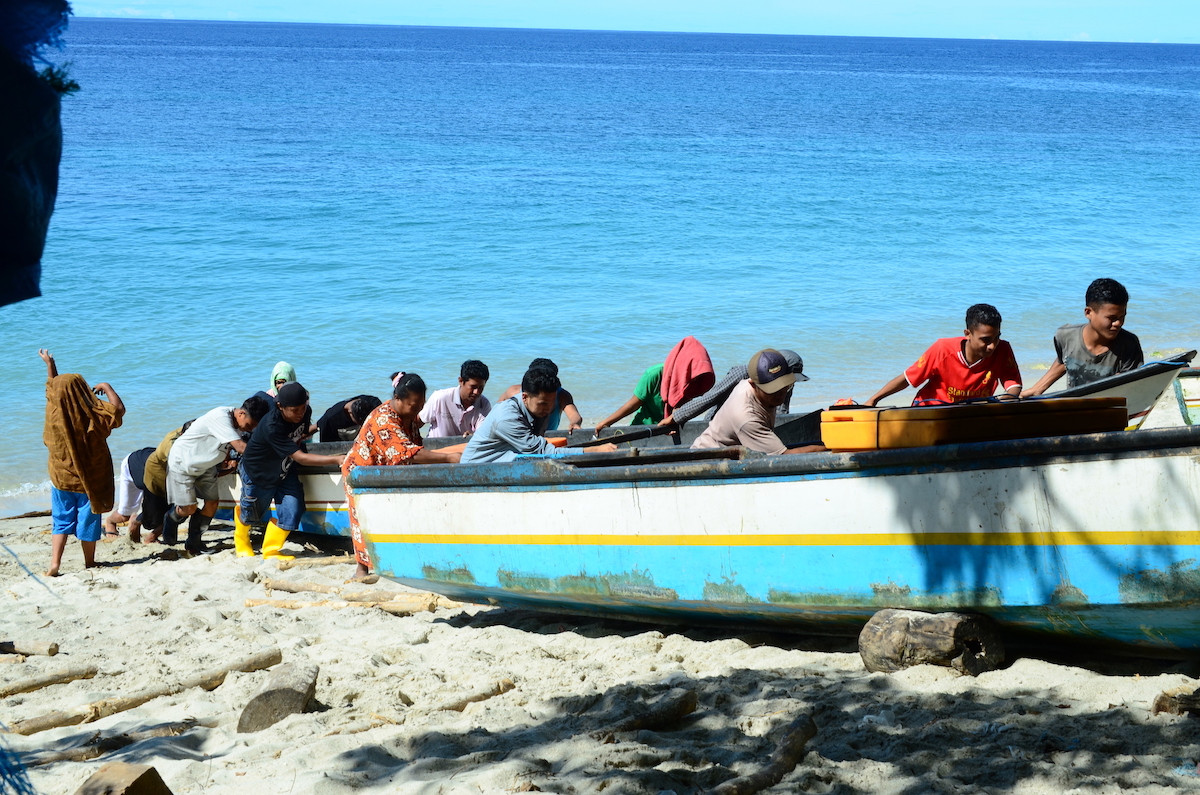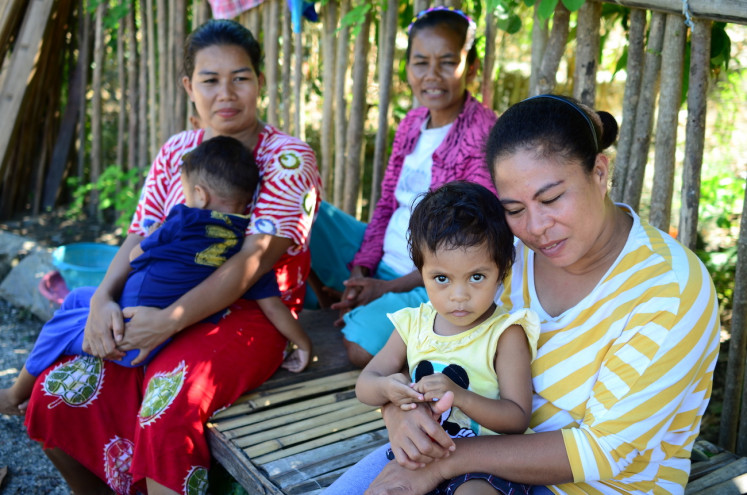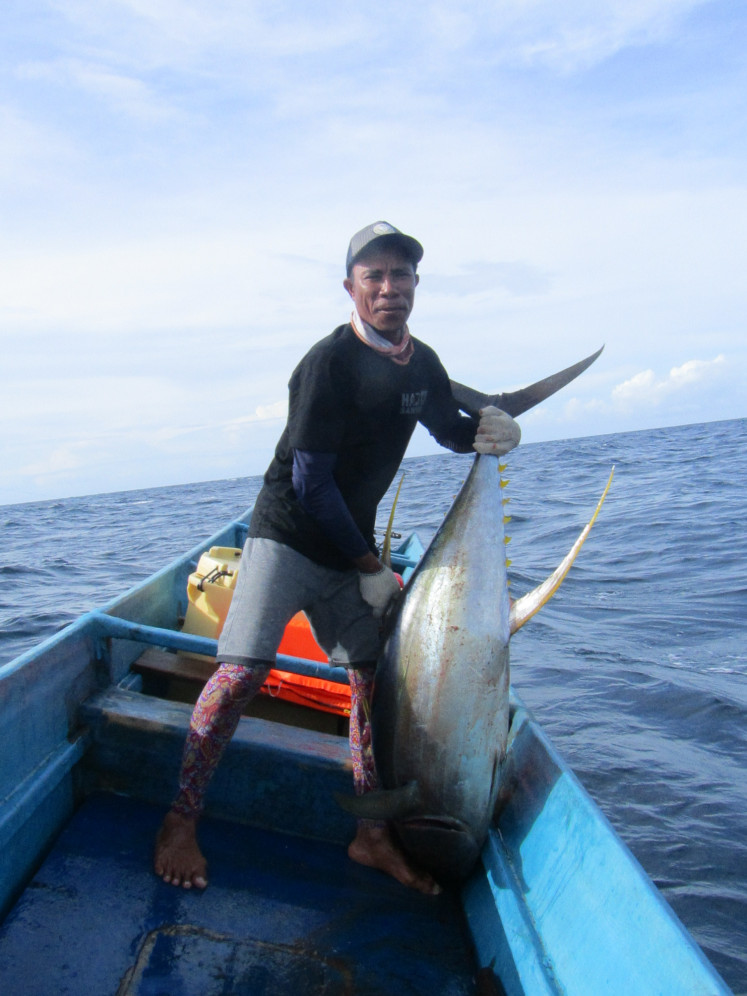Popular Reads
Top Results
Can't find what you're looking for?
View all search resultsPopular Reads
Top Results
Can't find what you're looking for?
View all search resultsMaluku handline fishermen prove sustainable fishing can be profitable
Umar explained that fishing sustainably under the 2014 Fair Trade partnership allowed local fishermen to be more systematic in fishing, managing finances and ensuring the legality of their catches.
Change text size
Gift Premium Articles
to Anyone
E
very day, dozens of fishermen on Buru Island, Maluku, brave the open seas in small boats and equipped with only handlines and hooks in search of the region’s local specialty, yellowfin tuna.
Buru Island native Umar Papalia, 41, has set out in his motorized boat daily for the last 13 years at the break of dawn to catch bait before hunting the tuna.
“We usually look for dolphins,” he explained. “Yellowfin tuna are friends with dolphins so if we find a dolphin on the surface, the yellowfin tuna will usually be in front of it.”
Umar returns to land by sunset at the earliest and if he is lucky to have caught the much-sought after tuna, he will weigh, store and send it to a factory for filleting and processing.
But Umar, with his sunbaked skin and arms scarred by fishing lines from struggling with big fish, is no ordinary fisherman. At least nine fishing communities made up of 123 fishermen like Umar have been certified by the Marine Stewardship Council (MSC) and its eco-label trademark, making them the first small-scale fisheries in Indonesia to receive the global recognition and the second-ever recipients in the country.
Now, fishermen from Buru Island set an example for other small-scale fisheries in Indonesia and around the world that sustainable fishing can improve the livelihoods of fishing communities as the global community celebrates World Oceans Day on June 8.
The award was the result of ongoing efforts initiated in 2012 by North America’s leading sushi-quality tuna company Anova, local processor Harta Samudra and the Indonesian Fisheries and Community Foundation (MDPI), which focuses on sustainable fisheries. They assisted Buru Island fishermen in getting Fair Trade certification in 2014 and forming Fair Trade Fishing associations, paving the way for the fishermen to attain the MSC certificate.
Umar explained that fishing sustainably under the 2014 Fair Trade partnership allowed local fishermen to be more systematic in fishing, managing finances and ensuring the legality of their catches.
It has also helped them develop awareness about preserving the environment by using handline fishing techniques.
“If we used nets or bombs, the tuna stocks would be depleted, and future generations would not have the chance to get to know yellowfin tuna and would only learn about them from history,” he said.
Overfishing threatens almost 65 percent of coral reefs in Indonesia, with half of these being threatened specifically by destructive fishing practices, the World Bank said in 2014. Trawlers, cantrang (seine nets), poison and bombs are among the fishing methods that have generally been deemed harmful to maritime biodiversity.
Yet maintaining healthy coral reefs is vital in maintaining the nation's fish stock, including yellowfin tuna, which in turn sustains fishermen’s livelihoods.
Read also: NGO coalition calls for sustainable fisheries policies
MDPI fisheries policy advisor Saut Tampubolon explained that the “one hook, one fish” aspect of handline tuna fishing made it one of the most eco-friendly fishing techniques as it allows fishermen to catch the specific fish they want and avoid harming other endangered species.
Around 600 yellowfin tuna fishermen under the MDPI’s guidance in six provinces, including Maluku, are currently practicing handline fishing, and fishing communities in at least three of the provinces now export their fish to the United States under the MDPI’s Fair Trade-USA partnership, Saut said.
Handline yellowfin fisheries account for around 2 percent of Indonesia’s overall tuna catch, including bluefin, yellowfin and skipjack, in a typical year but more than 13 percent of the yellowfin tuna is caught using the method, the Indonesian Pole-and-Line and Handline Fisheries Association (AP2HI) states on its Indonesian Tuna Initiative official website.
“With the MSC awards, there’s a large chance that we can expand to a broader international market, including all of Europe and America as well as Russia,” it says, adding that this will ultimately improve the welfare of Buru Island fishing communities.
A fisherman from Waprea village, Buru regency, Maluku, Yusran Tomia, shows off his catch, a large yellowfin tuna. Fishermen from Buru Island have set an example for other small-scale fisheries in Indonesia and around the world that sustainable fishing can improve the livelihoods of fishing communities as the global community celebrates World Oceans Day on June 8. (Courtesy of MDPI/-)Fisherman Yusran Tomia said that the MSC represented a beacon of hope for his family. “The most important thing that my family felt about [receiving the MSC certificate] is that there’s great hope now with the broader market access so that we won’t doubt anymore whether our fish will be sold,” he said.
But it was not always smooth sailing for the local fishermen. Rustam Tuharea, 49, said that before the Fair Trade partnership started in the island, fishermen would struggle to earn Rp 1 million (US$70.33) every month.
They would face hurdles in finding markets other than their own village or neighboring ones to sell their catch and their savings would quickly run out as a result of poor financial-management skills.
“After a month of fishing, we were often shocked when we would ask our wives, ‘is there any money left?’ at the end of the month and they often replied ‘there’s none left’,” Rustam said.
Another fisherman, Janu Buton, 50, said that fishermen used to work by themselves and would rarely cooperate with each other, let alone complain to local officials in case of problems. Now, Janu can communicate his worries to local authorities.
The fishermen themselves are not the only ones benefiting from sustainable fishing either. Buru Island housewife Norma Tomia said she can now better save for her children’s education thanks to her husband's stable income and an MDPI-Fair Trade incentive program.
The program gives a US 20 cent bonus for every kilogram of fish that is exported under the Fair Trade certification. The money is then distributed and used for each association’s own programs, including for children’s educational purposes.
“Our hope is that they can achieve higher education and we can support them throughout their youth,” she said. Her eldest daughter is now enrolled in high school while her youngest son has just finished elementary school.
Editor's note: This article has been updated.












